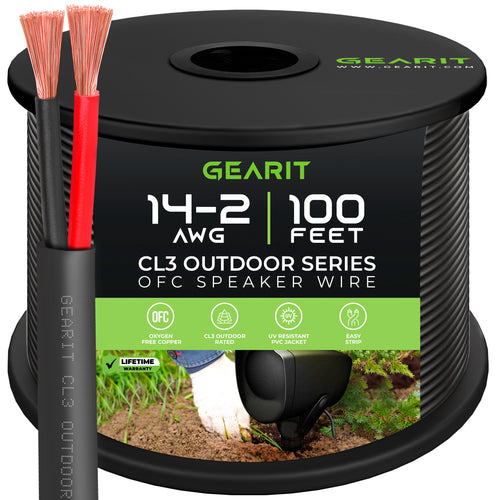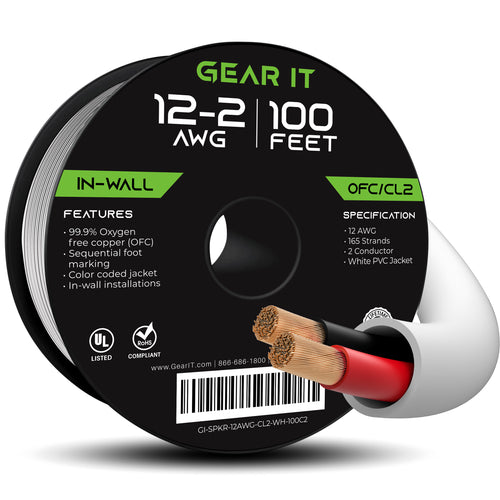Selecting the right outdoor speaker wire is crucial to ensuring your outdoor audio system delivers optimal performance. With various options available, it's important to understand the key factors that will help you make an informed decision. In this guide, we'll explore the different types of outdoor speaker wire, the factors to consider when choosing one, and how to match the wire to your specific outdoor audio system needs.
Types of Outdoor Speaker Wire
1. Standard Speaker Wire
Standard speaker wire is a basic option suitable for short-distance connections and less demanding environments. It usually consists of two insulated conductors encased in a single outer jacket. While it's affordable and easy to install, it may not provide the best durability and protection against the elements.
2. Direct Burial Speaker Wire
Direct burial speaker wire is designed to be buried directly in the ground without the need for additional conduit. It features a durable, UV-resistant, and waterproof jacket that protects the internal conductors from moisture, pests, and other environmental factors. This type of wire is ideal for long-term outdoor installations where the wire needs to be hidden.
3. In-Wall Rated Speaker Wire
In-wall rated speaker wire, also known as
CL2 or
CL3 wire, is suitable for both indoor and outdoor installations. It meets specific safety standards for in-wall use, making it a versatile option for those who want to run their speaker wire through walls, ceilings, or underground conduits. Its durable construction ensures it can withstand outdoor conditions as well.
Factors to Consider When Choosing Outdoor Speaker Wire
1. Gauge
The gauge of the wire refers to its thickness, with lower numbers indicating thicker wire. For outdoor speaker systems,
14-gauge or
12-gauge wire is recommended. Thicker wire (lower gauge) reduces resistance, allowing for better signal transmission over long distances. If your speakers are located far from the amplifier, opting for a thicker wire can prevent signal loss and maintain audio quality.
2. Material
The most common materials used for speaker wire conductors are copper and copper-clad aluminum (CCA).
●
Copper: Pure copper wire offers superior conductivity and durability, making it the best choice for high-quality audio performance.
●
Copper-Clad Aluminum (CCA): CCA wire is a more budget-friendly option. While it provides decent performance, it is less conductive and durable than pure copper. For the best results, especially in demanding outdoor environments, pure copper wire is recommended.
3. Insulation and Jacket
The insulation and jacket of the wire play a critical role in protecting it from the elements. Look for wires with the following features:
● UV Resistance: Ensures the wire can withstand prolonged exposure to sunlight without degrading.
● Waterproofing: Protects the wire from moisture, preventing corrosion and short circuits.
● Durability: A robust outer jacket can resist damage from physical impacts, such as garden tools or wildlife.
4. Length and Distance
Consider the distance between your audio source (amplifier or receiver) and the speakers. Measure the required length of wire and add a little extra to account for any twists, turns, or elevation changes.
Choosing the appropriate gauge based on the distance is essential to minimize signal loss.
Matching the Wire to Your Outdoor Audio System Needs
1. Assess Your Environment
Evaluate the environment where your outdoor speaker system will be installed. Factors like exposure to sunlight, rain, temperature fluctuations, and potential physical damage should influence your choice of wire. For instance, if you live in an area with harsh weather conditions, opt for a wire with a durable, weather-resistant jacket.
2. Determine Your Audio Quality Requirements
If you're an audiophile seeking the best sound quality, investing in
high-quality, pure copper wire with a thicker gauge is worthwhile. For more casual listening,
CCA wire might suffice, but keep in mind the potential trade-offs in durability and performance.
3. Plan the Installation Route
Carefully plan the installation route of your
speaker wire. If the wire will be buried, direct burial wire is the best choice. For above-ground installations, ensure the wire is secured and protected from physical damage. If running the wire through walls or conduits, in-wall rated wire is recommended.
4. Budget Considerations
While it's important to stay within your budget, remember that investing in high-quality wire can prevent future issues and improve the longevity of your outdoor audio system. Balance cost with the need for durability and performance based on your specific setup and environment.
Conclusion
Choosing the right outdoor speaker wire involves understanding the types of wire available, considering key factors like gauge, material, and insulation, and matching the wire to your outdoor audio system's specific needs. By taking the time to select the appropriate wire, you can ensure your outdoor speakers deliver the best possible sound quality and performance for years to come. Whether you're setting up a simple patio system or an elaborate garden audio setup, the right speaker wire makes all the difference.




























